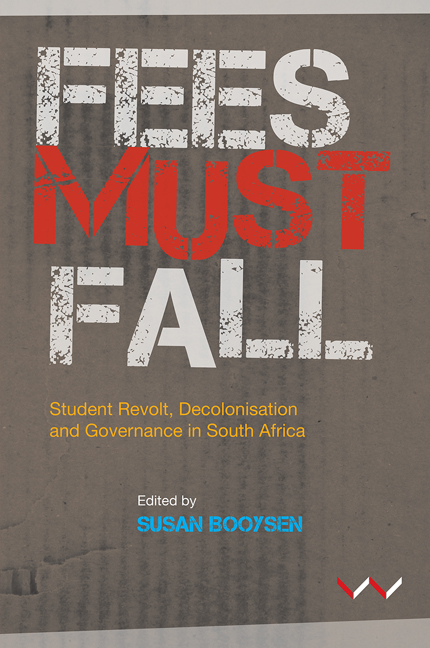Book contents
- Frontmatter
- Contents
- Acknowledgements
- Preface
- Introduction
- PART ONE POWER REDEFINED – ‘WHAT HAPPENED TO GOVERNANCE?’
- PART TWO PRIMARY VOICES – ‘THE ROOTS OF THE REVOLUTION’
- PART THREE THE REVOLT – ‘RISING AGAINST THE LIBERATORS’, SOUTH AFRICA IN AFRICA
- Chapter 6 Standing on the shoulders of giants? Successive generations of youth sacrifice in South Africa
- Chapter 7 Learning from student protests in sub-Saharan Africa
- Chapter 8 Unfinished revolutions: The North African uprisings and notes on South Africa
- PART FOUR POWER AND CLASS REDEFINED – ‘SIT DOWN AND LISTEN TO US’
- PART FIVE JUSTICE, IDENTITY, FORCE AND RIGHTS – ‘WE CAME FOR THE REFUND’
- APPENDICES
- Contributors
- Index
Chapter 7 - Learning from student protests in sub-Saharan Africa
from PART THREE - THE REVOLT – ‘RISING AGAINST THE LIBERATORS’, SOUTH AFRICA IN AFRICA
Published online by Cambridge University Press: 20 April 2018
- Frontmatter
- Contents
- Acknowledgements
- Preface
- Introduction
- PART ONE POWER REDEFINED – ‘WHAT HAPPENED TO GOVERNANCE?’
- PART TWO PRIMARY VOICES – ‘THE ROOTS OF THE REVOLUTION’
- PART THREE THE REVOLT – ‘RISING AGAINST THE LIBERATORS’, SOUTH AFRICA IN AFRICA
- Chapter 6 Standing on the shoulders of giants? Successive generations of youth sacrifice in South Africa
- Chapter 7 Learning from student protests in sub-Saharan Africa
- Chapter 8 Unfinished revolutions: The North African uprisings and notes on South Africa
- PART FOUR POWER AND CLASS REDEFINED – ‘SIT DOWN AND LISTEN TO US’
- PART FIVE JUSTICE, IDENTITY, FORCE AND RIGHTS – ‘WE CAME FOR THE REFUND’
- APPENDICES
- Contributors
- Index
Summary
INTRODUCTION
Much is often made of South Africa's exceptionalism and its outlier position on the continent. In contrast, this chapter argues that examination of the recent student protests of South Africa, the continent's ‘last born’, is enriched by understanding the history of student protests elsewhere in Africa. In the chapter, we review the literature on student protests in sub-Saharan or ‘middle Africa’ (Mamdani 2008), drawing selectively on insights from Francophone, Lusophone and Anglophone regions. Reviews of student protests in Africa mostly categorise them in terms of political and historical periods: the colonial period; the post-independence period (1960–1985); the structural adjustment, protest for democratic reform and economic decline period (1985–2000); and the post- 2000 period of multiparty democracy (Federici, Caffentzis and Alidou 2000; Luescher-Mamashela and Mugume 2014). Mahmood Mamdani (2008) labels the first three periods as colonial, nationalist and neoliberal.
This chapter looks at significant forces that have shaped student movements in Africa as reflected in dominant academic and political literature. We examine student protests and looking at how they were shaped by political developments, particular policies and various governments’ provision of and coordination of policy in higher education – governance in Francis Fukuyama's (2013) terms. African countries share a historical experience of colonialism and subsequent periodic responses to it. Although the nature of the colonial experience may account for the differences in performance of higher education systems across the countries (Mamdani 2008), the colonial experience shaped the structure, organisation and governance of higher education systems and the production of the nationalist elite that would rule after independence. In most countries, post-independence, students were part of the new elite and also saw themselves as protecting its gains against external forces – but they also began to act as the social conscience and voice of the broader society. Student protests have responded to and – in some cases – shaped responses to externally driven and internally driven political and economic events in particular historical periods.
In this chapter we discuss the key features of these periods in terms of politics, public policy and patterns of governance, and include a table summarising these features (see Appendix 3). We examine each historical period in terms of these three issues and identify the patterns of student protest.
- Type
- Chapter
- Information
- Fees Must FallStudent revolt, decolonisation and governance in South Africa, pp. 148 - 168Publisher: Wits University PressPrint publication year: 2016



